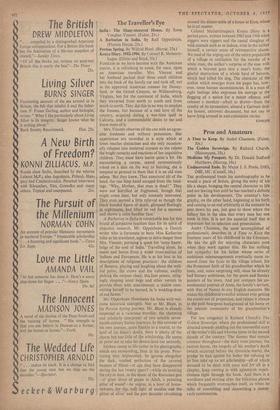The Traveller's Eye
FAMILIAR as we have become with the American tourist, it is refreshing to come, for once, upon an American traveller. Mrs. Vincent and her husband packed their three small children into the back of the family car and took off, not in the approved American manner for Disney- land, or the Grand Canyon, or Williamsburg, Virginia, but for the continent of India, which they traversed from north to south and from south to north. They did this in no way to emulate the Joneses, but because of a real love of the country, acquired during a war-time spell in Calcutta, and a commendable desire to see and know more of it.
Mrs. Vincent observes all she can with an agree- able freshness and without pretension. Her experiences are recorded in a style which at times reaches distinction and she only occasion- ally relapses into maternal coyness as she relates the bright remarks and reactions of her inquisitive children. They must have learnt quite a bit. On encountering a corpse, seated ceremoniously robed on a dais on the way to burning, she is tempted to pretend to them that it is an old man asleep. 'But they knew. That unnatural tilt of the head, the one limp hand escaped from the bind- ings. "Why, Mother, that man is dead!" They were not horrified or frightened, though that might come later, but only intensely interested. They even seemed a little relieved as though the black hooded figure of death, glimpsed fleetingly in nightmares, had lifted its veil for a moment and shown a calm familiar face.'
A Barbarian in India is remarkable less for this brand of subjective reaction than for its spirit of objective research. Mr. Oppenhejm, a Danish writer who is fortunate to have Miss Katherine John as his translator, aspires to delve deeper than Mrs. Vincent, pursuing a quest for 'some know- ledge of the soul of India.' Travelling alone, he meets and learns from a wider cross-section of Indians and Europeans. He is at his best in his descriptions of religious practices: the children of Benares, playing and laughing about the well- fed pyres; the crows and the vultures, swiftly picking the corpses clean; the. Jain priests, oblig- ingly sleeping amid bugs and other vermin to provide them with nourishment; a widow com- mitting herself to be burned, in 'a wedding-dress of red flames.'
Mr. Oppenhejm illuminates his India wittrwel- come historical sidelights. Not so Mr. Blunt, in his Persian Spring journey. Mr. Blunt is already respected as a vicarious traveller, the charming and scholarly interpreter of two notable seven- teenth-century Italian journeys. In this account of his own journey, quite frankly as a tourist, to the land of his heart's desire, there is plenty of the charm but too little of the scholarship. He seems at pains not to take his dream-land too seriously.
Isfahan comes to life rather in his photographs, which are outstanding,, than in his prose. Pene- trating into Afghanistan, he ignores altogether the dark, vaulted perfection of the covered bazaars of Herat—or can they have disappeared during the last twenty years?—while on entering the city at dusk, to the music of the Ramadan gun --a' great shout of praise to Allah, a pulsating pillar of sound'—he yearns, in a bout of home- sickness, for the 'soft light of candles and the glitter of silver' and the port decanter circulating around the dinner-table of a house at Eton, where he is art master.
Colonel Meinertzhagen's Kenya Diary is a period piece, written between 1902 and 1906 when niggers were niggers and the casual slaughter of wild animals such as to induce, even in the author himself, a certain sense of retrospective shame. We read of the wiping out of the entire population of a village in retaliation for the murder of a white man; the author's surprise at the ease with which a bayonet goes into a man's body; the gleeful destruction of a whole herd of baboon, which had killed his dog. The character of the author which emerges from his pages has, how- ever, some human inconsistencies. It is a man of right feelings who expresses his outrage at the flogging of a native for a minor offence, and releases a monkey—albeit to drown—from the cruelty of its tormentors, aboard a German ship. An honest, extrovert document, but not one to leave lying around in anti-colonialist circles.
KINROSS






















































 Previous page
Previous page